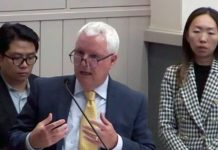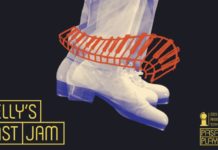As studies continue on the effect of chronic traumatic encephalopathy (CTE) on those who play tackle football, Joseph Charney can see the day when the sport, which features the country’s biggest game – the Super Bowl, which just happens to be a cultural revolution in the country, no longer played.
“Yes, absolutely,” said Charney, matter-of-factly, when asked if America’s most popular sport – football – will disappear, be gone, kaput, go by the wayside and take the sport’s grand finale, a February ritual, with it.
“There will be no football as played this way,” said the South Pasadena resident, seeking to one day see a major change to the athletic department at the local high school.
Yes, with the absence of the football includes the Super Bowl, the yearly extravaganza that seems like a virtual national holiday. It’s as part of Americana as turkey at Thanksgiving and lights at Christmas. Gone? Yes, Charney, who not longer wants to watch football, is concerned about the futures of those strapping on helmets and the brain damage it causes for some.

He came to Tuesday night’s Board of Education meeting asking board members to consider ending the football program at South Pasadena High, noting, “There is a growing consensus that tackle football can and does cause Chronic Traumatic Encephalopathy,” he told the 5-member panel. “CTE can lead to rage, impulsivity, depression, confusion and memory loss. It is a devastating and non-reversible disease. It is caused by repetitive impacts and not just concussions.”
When the issue was raised as part of an agenda item described as “Football and Brain Disease,” a discussion took place among board members, who agreed they will continue to monitor the situation and look at the data presented by Charney, but left the sport intact for now at SPHS.
South Pasadena Unified School District Superintendent Geoff Yantz said the California Interscholastic Federation (CIF), the governing body for high school sports programs in Southern California, has conducted an extensive effort in the area of sports related head injuries and concussions over the past two years. “The legislature has also provided new laws and regulations for specific protocols around concussions,” explained Yantz, noting that CIF has a panel of experts providing guidance to the legislature. “There has been a great deal of effort in the education of athletes as well as parents and coaches. They are required to go through certification training (regarding concussions). Parents receive a notification regarding athletics and acknowledge the sport is a risk. It basically says there can be serious harm or catastrophic and fatal injuries that can occur. CIF is not only looking at football. It’s all sports.”
Three identified concussions were suffered in either boys or girls soccer this season and two were recorded during the football season, according to the superintendent. “Soccer has proven to be just as dangerous,” said Yantz. “We’ve had water polo issues. We’ve had issues in softball and baseball. CIF is providing guidance (of the concerns) in all sports, not just specializing in football.”
He added, “I think it’s important that if you take a look at football, you have to look at all contact sports. No one can disagree that football is a high risk sport with the repeated contact, but there are other sports that pose that risk as well.”
“It’s a really important topic,” said Board Member Dr. Michele Kipke, explaining that her daughter grew up playing soccer and volleyball and concussions were reported in both activities. “It’s in every single sport.”
Board member Jon Primuth, raised the point that study on the CTE issue has been conducted at Boston University and he will continue to monitor it. “We will certainly pay attention to consensus evidence. We will certainly pay attention to CIF recommendations, but all I can find is one study. It self-admitted the mechanisms are poorly understood. So, until we see a growing body of evidence, I’m not sure there is anything to study.”
Primuth said there’s no reason to create a local study group and he’s going to rely on the CIF safety task force findings in protecting athletes participating in sports. “We’ve got the right people looking at this and I’m going to continue to look (at this issue) as further studies are developed.”
Julie Giulioni talked about her own son’s positive experience in playing football at South Pasadena High about 10 years ago. Giulioni read a brief statement from her son, who replied by text “probably” when asked by his mom if he ever suffered a concussion. “I think football was one of the most important things I’ve ever done in terms of my development as an employee and as a man,” he wrote in part. “I learned the importance of grit, body and mind, hard work, leading by example and dozens of other lessons that I still use today.”
Giulioni said athletics continue to offer tremendous benefits and wants them provide students opportunities outside the classroom that are equally constructive. Primuth added that football has a “critical role” to play in many people’s lives.
South Pasadena High Principal Janet Anderson hasn’t experienced an outcry from parents saying, “We need to end this,” she told the Board. “We’ve had a few calls from middle school parents for flag football at the high school, but they haven’t come about in any formal way. I’ve just kind of heard that through the grapevine.”
Following the meeting, Anderson said she was pleased the Board of Education is taking “a studied look at this issue. They are willing to seek outside resources and input so they will have sufficient evidence to consider.”
Board member Dr. Michele Kipke added, “This is a complicated issue for so many reasons. I hope this is just not a single conversation that we are having. I hope we’re continually thinking about it.”
She found another study from the Foundation of Medicine on concussions and ordered it for the Board and others to observe. “I’m happy to share it with folks,” she said. “As we’re getting more and more evidence I hope we will watch it more carefully. If we are unnecessarily putting kids at risk, I think it’s something we need to take responsibility for.”
Charney believes that the case against football will continue to grow and will be made more powerful when the detection of the disease need not wait for brain autopsies. “When I read reports about this issue, I was forced to conclude that youth football programs unreasonably endanger the health of those boys who choose to participate,” he told the Board. “That’s why I’m here, to urge you to end this dangerous activity. I say forced to conclude, because we recognize there are many positive aspects of the game and the role it plays in our community. Understandably, there will be reluctance to ending the program, and it shouldn’t be done precipitously. Fortunately, our high school offers at least 10 team activities they can participate in other than football.”
He’s listened to the argument that all sports involve risks, saying, “The rebuttal to this lies in the difference between reasonable risk of injury and risk of chronic, irreversible and horribly debilitating disease. One can break bones or sustain bloody noses or twisted ankles playing other sports. When we speak of CTE, however, we are speaking of the triggering of a destructive response by the body’s chemistry to repetitive brain trauma. A response that produces deleterious proteins that destroy brain tissue.”
He says his statements about the dangers of the game are backed up by current basketball star Lebron James and former NFL great Brett Favre, who, according to Charney, both say they would never let their kids play football.
“I have a whole problem with this sport as it goes out into the colleges,” explained Charney. “Very few of them [players] go onto the NFL. (Those that do) play three years, wreck themselves and a good portion of them are bankrupt after three more years. It’s a very exploitive system along the way. Having said that, Friday night football for high schools is a cultural phenomenon. That’s what makes this issue so difficult.”
Charney told the Board that brain images of how the disease progresses are chilling. “More and more parents choose to prohibit their sons from playing tackle football,” he said. “But the decision can’t be left to parents or is it one to be decided at the ballot box. Ultimately the decision must be made by this Board. It is the Board that can hold hearings, secure independent expert testimony from all sides, deliberate and act on the recommendations. At the end of the day, if the decision is to continue the program, the City would at least be able to demonstrate its due diligence and be better prepared to defend itself against litigation.”
Charney concluded his remarks by saying brains of teens “are too precious to risk the destructive outcomes resulting from the violent impact that football requires.”
And the big question remains to be seen for Charney. “I wonder if anybody would put their kid in now after reading all this?” he asked. “I’m sure I wouldn’t put my kid in.”
Which takes us back to his initial outlook. “There will be no football eventually,” he insisted.


















.png)










